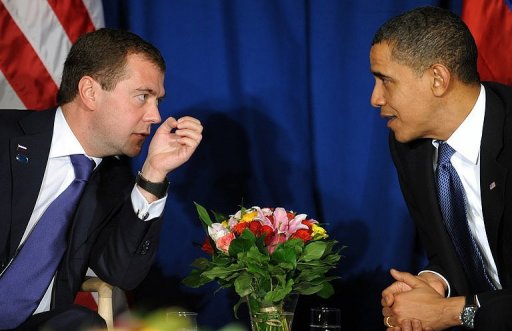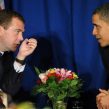
START Treaty Not Ready, While Afghan Cooperation is Stalled
Publication: Eurasia Daily Monitor Volume: 7 Issue: 4
By:

Moscow and Washington have failed to complete a strategic nuclear arms control agreement before the end of 2009. This failure may cast a long shadow on other more urgent issues, such as cooperation on Afghanistan and the Iranian nuclear issue. The failure underlines the gap in trust and overall strategic objectives that separates the US and Russia. Presidents Barack Obama and Dmitry Medvedev tried and failed to cover this gap with nice rhetoric during their numerous summit meetings in 2009.
US State Secretary Hillary Clinton and Russian Foreign Minister Sergei Lavrov in early March 2009 pressed a large red button on a small yellow box, symbolizing a “reload” in bilateral relations. During their first face-to-face meeting on April 1 in London on the sidelines of a G20 summit Obama and Medvedev signed a memorandum announcing their intention to “move beyond Cold War mentalities” and work together on arms control, missile defense, WMD proliferation, fighting international terrorism, containing Iran’s nuclear ambitions, Russia’s WTO membership, among others (www.kremlin.ru, April 1). Arms control negotiators began intense work to hammer out a new treaty to replace the Strategic Arms Reduction Treaty or START-1 before its expiry date on December 5, 2009. During Obama’s visit to Moscow last July both presidents signed a framework agreement on strategic nuclear arms that was designed to cut within 10 years the number of deployed warheads on both sides to 1,500-1,675 and strategic delivery systems to 500-1,100. Both presidents expressed official optimism that a comprehensive treaty would be ready for approval by the end of 2009 (www.kremlin.ru, July 6). During the July summit in Moscow an additional agreement was signed to allow US air transit of troops and supplies through Russian airspace to Afghanistan that was reported to permit some 4,500 air flights annually. Russia reportedly waived the right to collect an estimated $133 million in navigation fees from these Afghan-destined military transit flights (EDM July 9). At present, US military flights successfully reach Afghanistan by bypassing Russia, while the transit agreement seemed to be the only definite result of the announced “reset” in US-Russian relations in 2009.
Last September, the Obama administration announced a decision to scrap plans to deploy Ballistic Missile Defense (BMD) interceptor missiles in Poland and a BMD X-range targeting radar in the Czech Republic, which had previously stimulated Russian ire. This apparent concession was accepted in Moscow with satisfaction, but Russian military and diplomatic experts distrusted American intentions and called for caution (Interfax, September 18). Till the end of 2009 Obama and Medvedev met three more times on the sidelines of multilateral forums: in September at the UN General Assembly in New York, the Singapore Asia-Pacific Economic Cooperation summit in November and during the December Copenhagen UN conference on global climate change. The only result of these meetings: more nice declarations of intent, but no tangible results.
The new START treaty was not signed. Both sides announced they were in broad agreement, with only “technicalities” not hammered out (RIA Novosti, December 21). But just before New Year, Russia’s true ruler –Prime Minister Vladimir Putin– disclosed that the problems were more serious. According to Putin the US was continuing to develop BMD systems that could in the future negate Russia’s nuclear deterrent capability, destabilize the world and promote “US aggressiveness.” Putin announced that Russia is not ready to allow free American access to telemetric data of intercontinental ballistic missile (ICBM) test launches, because this data may help the US to perfect its BMD systems to Russia’s detriment. Putin promised that Russia will “develop new offensive nuclear weapons” to overcome the US BMD (ITAR TASS, December 29). The exchange of telemetric data on ICBM test launches was a key part of verification and confidence building measures under START-1 that expired on December 5.
In the latter half of January US and Russian negotiators will resume their efforts to complete a new START treaty in Geneva. However, if in accordance with Putin’s statement, BMD issues become linked to the START talks, they may become deadlocked. It is equally possible that if a treaty is prepared that fails to provide stringent verification procedures, it may get stuck during ratification in the US Senate and might never become law.
The agreement on US military air transit to Afghanistan has also failed to materialize. Because of unspecified “technical problems” instead of the announced capability to fly twelve heavy transport aircraft through Russian airspace every 24 hours, there was only one US transit test flight in 2009 (www.gazeta.ru, December 29). The Russian military compares the US and allied military effort in Afghanistan with the failed Soviet campaign in the 1980’s (Rossiyskaya Gazeta, December 25). There is an overall consensus in Moscow that the US and NATO will surely fail where Russia did, and that there is no reason to full-heartedly support a lost cause. Russia is ready to step in as a leader of a future new coalition to defend former Soviet Central Asia against an Islamist threat after the US and NATO are finally defeated in Afghanistan by the Taliban. Such an outcome could solidify Russian dominance in a highly strategically sensitive region, while a decisive coalition success in Afghanistan that would strengthen Western influence –is not welcome.




